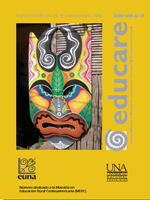La participación en las comunidades rurales: abriendo espacios para la participación desde la escuela
DOI:
https://doi.org/10.15359/ree.12-Ext.10Keywords:
participation, education, international legislationAbstract
The article id based on the participation in the country school, It goes over the national and international legislation, is important to stand out the fact that this article establish questions that the personal teaching will affront if he wants to open a space to participate in country school. Besides it includes and develops the share capital concept and relate it whit the educational theme.
References
Crowley, P. (1998). Participación infantil: Para una definición del marco conceptual. En B. Abegglen
y R. Benes (Comp.), La participación de niños, niñas y adolescentes en el contexto de la
Convención de los Derechos del Niño. Visiones y Perspectivas (pp. 9-16). Florencia, Italia:
UNICEF.
Durston, J. (1997). La participación comunitaria en la gestión de la escuela rural. En E. Cohen (Aut.),
Educación, eficiencia y equidad (pp. 68-84). Santiago, Chile: Ediciones SUR. Consultado el
de noviembre de 2007 de http://www.sitiosur.cl/r.php?id=714
Galán, J. L. y Castro, I. (2004). Las relaciones interorganizativas como fuente de capital social.
Universia Business [Actualidad Económica], pp. 104-117. Consultado el 20, octubre, de 2007
de http://www.google.co.cr/search?hl=es&q=Granovetter%2B1985%2Btejido+social&btnG=
Buscar&meta=
Organización de las Naciones Unidas [ONU]. (1948). Declaración Universal de los Derechos
Humanos. Consultado el 22, noviembre de 2007 de www.un.org/spanish/hr/
Downloads
Published
How to Cite
Issue
Section
License
1. In case the submitted paper is accepted for publication, the author(s) FREELY, COSTLESS, EXCLUSIVELY AND FOR AN INDEFINITE TERM transfer copyrights and patrimonial rights to Universidad Nacional (UNA, Costa Rica). For more details check the Originality Statement and Copyright Transfer Agreement
2. REUTILIZATION RIGHTS: UNA authorizes authors to use, for any purpose (among them selfarchiving or autoarchiving) and to publish in the Internet in any electronic site, the paper´'s final version, both approved and published (post print), as long as it is done with a non commercial purpose, does not generate derivates without previous consentment and recognizes both publisher's name and authorship.
3. The submission and possible publication of the paper in the Educare Electronic Journal is ruled by the Journal’s editorial policies, the institutional rules of Universidad Nacional and the laws of the Republic of Costa Rica. Additionally, any possible difference of opinion or future dispute shall be settled in accordance with the mechanisms of Alternative Dispute Resolution and the Costa Rican Jurisdiction.
4. In all cases, it is understood that the opinions issued are those of the authors and do not necessarily reflect the position and opinion of Educare, CIDE or Universidad Nacional, Costa Rica. It is also understood that, in the exercise of academic freedom, the authors have carried out a rogorous scientific-academic process of research, reflection and argumentation thar lays within the thematic scope of interest of the Journal.
5. The papers published by Educare Electronic Journal use a Creative Commons License:














 The articles published by Educare Electronic Journal can be shared with a Creative Commons License:
The articles published by Educare Electronic Journal can be shared with a Creative Commons License: 



